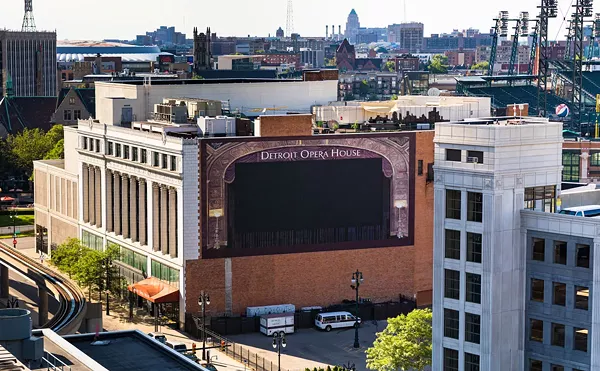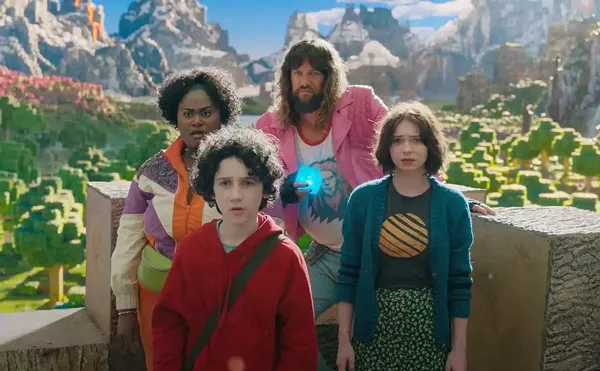Despite what Paul Haggis's race drama, Crash, may have had you believe, interconnected plotlines and an all-star ensemble are nothing new. As anyone who watched TV in the '70s knows, a The Love Boat-Fantasy Island double-feature of star-studded storylines screened every Saturday night on ABC.
That didn't stop Emilio Estevez from trying to make this year's Crash. Or maybe Nashville. Or even Grand Hotel (which he gracelessly name-drops). Whichever Bobby is, his heartfelt desire to create something of significance is so palpable it's hard to beat up on the film, even if it is a sprawling, clichéd mess.
Set during the 24-hour period before RFK's assassination, 23 characters of all stripes struggle with life and love under the roof of the renowned Ambassador Hotel amid the political and social upheaval of the 1960s. There's the politically progressive but personally flawed hotel manager (William H. Macy) who's cheating on his hairdresser wife (a barely recognizable Sharon Stone) with a sexy switchboard operator (Heather Graham). Meanwhile the hotel's racist kitchen manager (Christian Slater) refuses to let anyone off to vote and forces the waitstaff to work a double shift. This leads baseball-loving busboy (Freddy Rodriguez) to sacrifice his Dodger tickets to chef Laurence Fishburne on the very night Don Drysdale broke the major-league record for pitching 58 scoreless innings.
The hotel guests include a troubled husband and wife (Martin Sheen and Helen Hunt), two lonely old codgers (Harry Belafonte and Anthony Hopkins), whiskey-soaked Virginia Fallon (Demi Moore) and her put-upon husband (Estevez), a pair of acid-dropping Democratic volunteers (Shia LaBeouf and Brian Geraghty), and a teen (Lindsay Lohan) determined to marry her classmate (Elijah Wood) to save him from Vietnam's front lines. Oh, and there are also members of Kennedy's campaign staff.
Unlike Crash, there's no unifying theme or elaborately constructed contrivance to tie the vignettes together other than the inevitable march toward Kennedy's assassination. Some characters directly connect to the tragic events and others are pointlessly irrelevant. Few connect as human beings; all are forced to spout awkward chunks of exposition.
Which isn't to say that Bobby is a complete failure. There are working moments, but they're fleeting. Lohan and Wood find poignancy in their brief storyline, Le Bouf earns laughs in a laughably bad drug trip, and Slater and Rodriguez conjure flesh-and-blood characters out of thin air. When the infamous gunshots finally ring out in the Ambassador's crowded kitchen, these are the only people we care about.
The rest of the cast vacillates between serviceable (Macy, Stone, Fishburne), lazy (Hopkins, Graham) and embarrassingly awful (Moore). Particularly bad is Ashton Kutcher's trippy drug dealer. If nothing else, you can use the cast to play a rousing game of connect the dots with Estevez's life and career ... or six degrees of Emilio, if you will. In which case, some links — like Laurence Fishburne — are harder than others.
It's easy to see why this topic would be appealing now; there was a time in this country when people believed that politicians could change things, that men of passion and ideals could right the wrongs of history and create hope for tomorrow. Robert Kennedy helped soothe the despair that followed Martin Luther King Jr.'s murder, and then, when he was killed, many wondered who was left to actually "dream." Of course, the last six years under Bush have left many similarly depressed.
Estevez is clearly moved by RFK's message of hope and responsibility. He peppers the film with lengthy montages of the war, the protests and the speeches from the '60s. But the archival footage makes us long for a well-honed documentary. Bobby's fictional contrivances come off as hollow and gimmicky.
The images in the final 10 minutes of the film are played out against one of RFK's most powerful and timeless speeches. It's undeniably moving, but Emilio hasn't earned one word of it. So, to spare you the pain of this well-meaning but misguided film, I offer up an excerpt of that address; words that could easily address our current situation: "Yet we seemingly tolerate a rising level of violence that ignores our common humanity and our claims to civilization alike. We calmly accept newspaper reports of civilian slaughter in far-off lands. ...
"Too often we honor swagger and bluster and wielders of force; too often we excuse those who are willing to build their own lives on the shattered dreams of others."
Get the rest online and save yourself $10.
Jeff Meyers writes about film for Metro Times. Send comments to letters@metrotimes.com.






